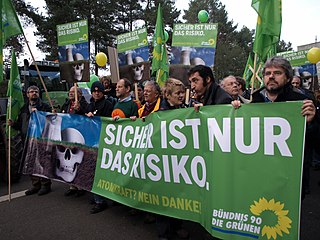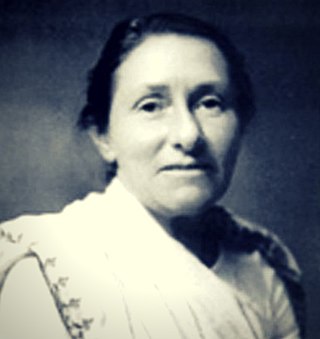
Vandana Shiva is an Indian scholar, environmental activist, food sovereignty advocate, ecofeminist and anti-globalization author. Based in Delhi, Shiva has written more than 20 books. She is often referred to as "Gandhi of grain" for her activism associated with the anti-GMO movement.

Tokyo Electric Power Company Holdings, Incorporated is a Japanese electric utility holding company servicing Japan's Kantō region, Yamanashi Prefecture, and the eastern portion of Shizuoka Prefecture. This area includes Tokyo. Its headquarters are located in Uchisaiwaicho, Chiyoda, Tokyo, and international branch offices exist in Washington, D.C., and London. It is a founding member of strategic consortiums related to energy innovation and research; such as JINED, INCJ and MAI.

Antonia Juhasz is an American oil and energy analyst, author, journalist and activist. She has authored three books: The Bush Agenda (2006), The Tyranny of Oil (2008), and Black Tide (2011).

The Fukushima Daiichi Nuclear Power Plant is a disabled nuclear power plant located on a 3.5-square-kilometre (860-acre) site in the towns of Ōkuma and Futaba in Fukushima Prefecture, Japan. The plant suffered major damage from the magnitude 9.1 earthquake and tsunami that hit Japan on March 11, 2011. The chain of events caused radiation leaks and permanently damaged several of its reactors, making them impossible to restart. The working reactors were not restarted after the events.

The anti-nuclear movement in Germany has a long history dating back to the early 1970s when large demonstrations prevented the construction of a nuclear plant at Wyhl. The Wyhl protests were an example of a local community challenging the nuclear industry through a strategy of direct action and civil disobedience. Police were accused of using unnecessarily violent means. Anti-nuclear success at Wyhl inspired nuclear opposition throughout Germany, in other parts of Europe, and in North America. A few years later protests raised against the NATO Double-Track Decision in Germany and were followed by the foundation of the Green party.

Mycle Schneider is a German nuclear energy consultant and anti-nuclear activist based in Paris. He is the lead author of The World Nuclear Industry Status Reports. He has advised members of the European Parliament on energy issues for more than twenty years. In 1997 he received the Right Livelihood Award.

The Fukushima nuclear accident was a major nuclear accident at the Fukushima Daiichi nuclear power plant in Ōkuma, Fukushima, Japan which began on March 11, 2011. The proximate cause of the accident was the 2011 Tōhoku earthquake and tsunami, which resulted in electrical grid failure and damaged nearly all of the power plant's backup energy sources. The subsequent inability to sufficiently cool reactors after shutdown compromised containment and resulted in the release of radioactive contaminants into the surrounding environment. The accident was rated seven on the INES by NISA, following a report by the JNES.

Fukushima 50 is a pseudonym given by English-language media to a group of employees at the Fukushima Daiichi Nuclear Power Plant. Following the Tōhoku earthquake and tsunami on 11 March 2011, a related series of nuclear accidents resulted in melting of the cores of three reactors. These 50 employees remained on-site after 750 other workers were evacuated.

The radiation effects from the Fukushima Daiichi nuclear disaster are the observed and predicted effects as a result of the release of radioactive isotopes from the Fukushima Daiichii Nuclear Power Plant following the 2011 Tōhoku 9.0 magnitude earthquake and tsunami. The release of radioactive isotopes from reactor containment vessels was a result of venting in order to reduce gaseous pressure, and the discharge of coolant water into the sea. This resulted in Japanese authorities implementing a 30-km exclusion zone around the power plant and the continued displacement of approximately 156,000 people as of early 2013. The number of evacuees has declined to 49,492 as of March 2018. Radioactive particles from the incident, including iodine-131 and caesium-134/137, have since been detected at atomospheric radionuclide sampling stations around the world, including in California and the Pacific Ocean.

The Japanese reaction occurred after the Fukushima Daiichi nuclear disaster, following the 2011 Tōhoku earthquake and tsunami. A nuclear emergency was declared by the government of Japan on 11 March. Later Prime Minister Naoto Kan issued instructions that people within a 20 km (12 mi) zone around the Fukushima Daiichi nuclear plant must leave, and urged that those living between 20 km and 30 km from the site to stay indoors. The latter groups were also urged to evacuate on 25 March.
To date, the nuclear accidents at the Chernobyl (1986) and Fukushima Daiichi (2011) nuclear power plants, are the only INES level 7 nuclear accidents.
The Fukushima disaster cleanup is an ongoing attempt to limit radioactive contamination from the three nuclear reactors involved in the Fukushima Daiichi nuclear disaster that followed the earthquake and tsunami on 11 March 2011. The affected reactors were adjacent to one another and accident management was made much more difficult because of the number of simultaneous hazards concentrated in a small area. Failure of emergency power following the tsunami resulted in loss of coolant from each reactor, hydrogen explosions damaging the reactor buildings, and water draining from open-air spent fuel pools. Plant workers were put in the position of trying to cope simultaneously with core meltdowns at three reactors and exposed fuel pools at three units.
Masataka Shimizu is a director of Fuji Oil Company, and was the president and chief executive officer of Japanese electric utility Tokyo Electric Power Company (Tepco) from 2008 to 2011. He was also a vice-chairman of Keidanren, the employers' federation of the companies of Japan, until he stepped down after the Fukushima Daiichi nuclear disaster. On July 25, 2012, he became an outside director of Fuji Oil.
Diane Wilson is an American environmental activist, an anti-war activist, and an author. In 1989, she was a shrimp boat captain in Calhoun County, Texas, and she saw an Associated Press article saying that the county had the most toxic waste disposal of all counties in America. Texas produces the most amount of chemical waste than any other state in the United States, with the majority of the pollution concentrated on the state's Gulf Coast. Wilson began a campaign against Formosa Plastics, a Taiwanese chemical company then building a PVC facility near her town, with tactics including several hunger strikes and sinking her own boat to draw attention to the matter. In 1994 she won "zero discharge" agreements from Formosa and Alcoa.

Long one of the world's most committed promoters of civilian nuclear power, Japan's nuclear industry was not hit as hard by the effects of the 1979 Three Mile Island accident (USA) or the 1986 Chernobyl disaster (USSR) as some other countries. Construction of new plants continued to be strong through the 1980s and into the 1990s. However, starting in the mid-1990s there were several nuclear related accidents and cover-ups in Japan that eroded public perception of the industry, resulting in protests and resistance to new plants. These accidents included the Tokaimura nuclear accident, the Mihama steam explosion, cover-ups after accidents at the Monju reactor, and the 21 month shut down of the Kashiwazaki-Kariwa Nuclear Power Plant following an earthquake in 2007. Because of these events, Japan's nuclear industry has been scrutinized by the general public of the country.

The Fukushima Daiichi reactor, was 1 out of 4 reactors seriously affected during the Fukushima Daiichi nuclear disaster on 11 March 2011. Overall, the plant had 6 separate boiling water reactors originally designed by General Electric (GE), and maintained by the Tokyo Electric Power Company (TEPCO). At the time of the earthquake, Reactor 4 had been de-fueled while 5 and 6 were in cold shutdown for planned maintenance. Unit 1 was immediately shut down automatically after the earthquake, and emergency generators came online to control electronics and coolant systems. However, the tsunami following the earthquake quickly flooded the low-lying rooms in which the emergency generators were housed. The flooded generators failed, cutting power to the critical pumps that must continuously circulate coolant water through the reactor core. While the government tried pumping fresh water into the core, it was already too late due to overheat. In the hours and days that followed, Unit 1 experienced a full meltdown.

The Fukushima Daiichi reactor, was 1 out of 4 reactors seriously affected during the Fukushima Daiichi nuclear disaster on 11 March 2011. Overall, the plant had 6 separate boiling water reactors originally designed by General Electric (GE), and maintained by the Tokyo Electric Power Company (TEPCO). In the aftermath, Unit 3 experienced hydrogen gas explosions and suffered a partial meltdown, along with the other two reactors in operation at the time the tsunami struck. Reactor 4 had been de-fueled while 5 and 6 were in cold shutdown for planned maintenance.

Investigations into the Fukushima Daiichi Nuclear Disaster (or Accident) began on 11 March 2011 when a series of equipment failures, core melt and down, and releases of radioactive materials occurred at the Fukushima Daiichi Nuclear Power Station from the 2011 off the Pacific coast of Tohoku Earthquake and tsunami on the same day.

Sarala Behn was an English Gandhian social activist whose work in the Kumaon region of India helped create awareness about the environmental destruction in the Himalayan forests of the state. She played a key role in the evolution of the Chipko Movement and influenced a number of Gandhian environmentalists in India including Chandi Prasad Bhatt, Bimala behn and Sunderlal Bahuguna. Along with Mirabehn, she is known as one of Mahatma Gandhi's two English daughters. The two women's work in Garhwal and Kumaon, respectively, played a key role in bringing focus on issues of environmental degradation and conservation in independent India.

Radioactive water from the Fukushima Daiichi Nuclear Power Plant in Japan began being discharged into the Pacific Ocean on 11 March 2011, following the Fukushima Daiichi nuclear disaster triggered by the Tōhoku earthquake and tsunami. Three of the plant's reactors experienced meltdowns, leaving behind melted fuel debris. Water was introduced to prevent the meltdowns from progressing further. When cooling water, groundwater, and rain came into contact with the melted fuel debris, they became contaminated with radioactive nuclides, such as iodine-131, caesium-134, caesium-137, and strontium-90.















